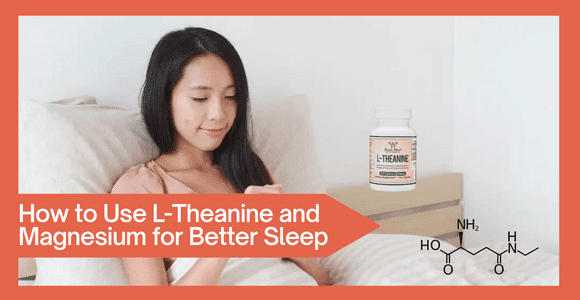We may be familiar with melatonin, but how about L-theanine and Magnesium? They are two of the most powerful sleep supplements that can help you get a restful night’s sleep.
Imagine this: You’ve followed your nightly routine to a T, kept all gadgets at bay since we know they disrupt our shut-eye… yet when you lay in bed it still feels like sweet slumber is an impossible dream. That’s where these natural remedies come into play!
L-Theanine supplement is thought to boost cognitive performance by stimulating certain brain chemicals and potentially even improve cardiovascular health. Although generally safe, it’s best to consult with a healthcare professional before taking this supplement.
Let us find out more about their unique features and benefits so we can finally drift off peacefully each evening.
Table of Contents
What are L-Theanine and Magnesium?
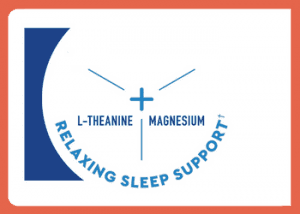 Natural amino acid theanine comes in two forms, L-theanine and D-theanine. When it acts like glutamate, it can block glutamate’s effects, while when it acts like glutamate, it can mimic them. Serotonin, GABA, and dopamine are also affected by it.
Natural amino acid theanine comes in two forms, L-theanine and D-theanine. When it acts like glutamate, it can block glutamate’s effects, while when it acts like glutamate, it can mimic them. Serotonin, GABA, and dopamine are also affected by it.
Relaxation and anxiety are among the benefits of L-theanine. It may help individuals fall asleep more easily by promoting relaxation and reducing stress levels.
There have been a few animal studies that suggest this supplement could help with dementia, high blood pressure, and unhealthy cholesterol levels.
The risks and side effects associated with this naturally occurring amino acid are minimal; however, always consult a doctor or professional before taking them.
A variety of potential health benefits:
| L-Theanine | Magnesium |
|---|---|
| An amino acid found in tea leaves | A mineral found in many foods and supplements |
| May promote relaxation and reduce stress | Involved in many bodily functions, including muscle and nerve function |
| May improve sleep quality | May help with constipation and migraines |
| May enhance cognitive function | May reduce the risk of heart disease and type 2 diabetes |
Magnesium is one of the most essential minerals for our bodies. Blood glucose control, blood pressure regulation, muscle and nerve function, and protein synthesis are all regulated by it. As the most abundant mineral in our bodies, it’s not necessarily made by our bodies, so we rely on food and supplements to provide it for us.
They can have potential side effects:
| L-Theanine | Magnesium |
|---|---|
| May cause drowsiness | May cause stomach upset, nausea, and diarrhea |
| May interact with some medications | May interact with some medications |
| May have a diuretic effect | May cause low blood pressure when taken in large doses |
| May cause allergic reactions in some individuals | May cause muscle weakness and difficulty breathing in very large doses |
Magnesium deficiency has been linked to diabetes type 2, heart disease, and Alzheimer’s disease. You can prevent such conditions by eating magnesium-rich foods like legumes, nuts, seeds, meat, fish, and green leafy vegetables. Magnesium supplements, however, are available if this doesn’t work.
Drug Interactions of L-Theanine and Magnesium
Taking L-theanine alongside medications for high blood pressure (antihypertensive drugs) is not recommended. As this supplement may lower your blood pressure, the combined use of these two compounds could cause a dangerously low level that needs medical attention right away.
By combining Magnesium and L-Theanine, you may experience a heightened level of relaxation and stress relief which could also improve your sleep quality and cognitive abilities.
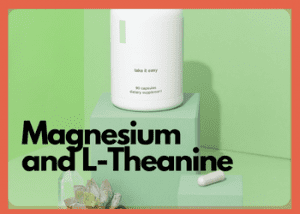 Therefore, it’s best to be cautious and consult with your doctor before taking both simultaneously.
Therefore, it’s best to be cautious and consult with your doctor before taking both simultaneously.
When taking magnesium supplements, it is essential to monitor other medications you are consuming to avoid any undesirable interactions.
Due to potential adverse interactions, it is strongly advised that magnesium supplements are avoided when taking medication for Parkinson’s disease.
It should also not be taken along with antibiotics like:
- Aminoglycoside antibiotics
- Quinolone antibiotics
- Tetracycline antibiotics
When taking magnesium supplements, it is recommended to avoid certain medications and drugs including bisphosphonates for high blood pressure, muscle relaxants, water pills, anticoagulant drugs such as digoxin and diabetes medicines, antacids, gabapentin supplements, or ketamine.
Additionally, sevelamer should not be taken in conjunction with the supplement. While it may be necessary to rely on medications, you should always speak with a doctor or healthcare professional in order to ensure the proper timing between doses.
Consulting an experienced practitioner is your most reliable source for advice when dealing with medication.
Can You Take Magnesium and L-Theanine Together?
Undoubtedly, taking magnesium and L-theanine together is generally considered secure. Both of these supplements are trusted for their safety as well as tolerability.
L-theanine with magnesium benefits: The combination of both can be synergistic, assisting in muscle and nerve optimization, decreasing anxiety while fostering relaxation, and enhancing sleep quality.
Nevertheless, it’s always better to confer with a healthcare expert before beginning any kind of supplementation program; they can provide advice on the appropriate dosage and possible side effects or interactions that may develop when consuming both supplements in conjunction.
What Does L-Theanine Do for Sleep?
Studies have indicated that L-theanine can potentially enhance sleep quality, create a sense of tranquility, and reduce levels of anxiety. Yet further research is vital in comprehending the full effects of sleep.
Although many people are aware L-theanine is present in multiple daytime beverages to subtly oppose caffeine or other stimulants’ stimulating effects, it ma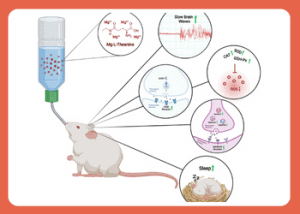 y not be the best way to use it as it might interfere with your nightly slumber at times.
y not be the best way to use it as it might interfere with your nightly slumber at times.
When it comes to achieving a restful slumber, l-theanine is the go-to suggestion.
This is because it has powerful properties that can help you have a restful night including:
- Improved relaxation within 30-60 minutes
- Enjoy a notable decrease in your anxiety level.
- High-energy individuals can experience great benefits from just a few small improvements in their sleep quality.
- A significant decrease in stress levels, overall.
- Decreases in the severity of insomnia (again with individuals with especially high energy)
Gaba and L-theanine dosage for sleep:
- While the exact dosage of GABA for sleep is still being studied, most users find success with taking 100-500mg daily.
- Although the suggested daily dosage of L-theanine for sleep is unknown, 200mg has traditionally been taken; yet certain studies indicate an even higher dose up to 400mg per day.
Timing is key when taking l-theanine, so make sure to take your nightly dose around 30 minutes before you drift off into dreamland.
L-Theanine and Caffeine
Tea leaves contain both L-theanine and caffeine, which are typically used in tandem with supplements and drinks.
 While L-theanine is a calming amino acid that can reduce stress levels, caffeine acts as an energizing stimulant.
While L-theanine is a calming amino acid that can reduce stress levels, caffeine acts as an energizing stimulant.
Consequently, when combined together there may be a synergistic effect – where the comforting effects of L-theanine counterbalance any jitteriness or uneasiness caused by the ingestion of caffeine.
By combining the ingredients in this supplement, it is possible to gain sharper mental focus and concentration. Reducing stress levels while fostering a sense of calmness has also been documented.
Additionally, research suggests that cognitive function, working memory, and attention can be improved as well with its use. However, prior to initiating any new supplementation routine one should always consult their healthcare provider first since caffeine levels may vary between products significantly.
Frequently Asked Questions
Can I Take L-theanine and Magnesium Before Bed?
L-Theanine and Magnesium are typically deemed secure when taken in the right quantities, and they’ve been used to encourage relaxation and raise sleep quality. Nevertheless, it’s always a smart idea to consult with your healthcare provider before taking any new supplement – especially at bedtime.
Does Magnesium and L-theanine Help you Sleep?
The studies say that Mg-L-Theanine is a powerful compound that has been repeatedly shown to not only improve sleep duration but also increase the power of slow wave activity in the brain.
In addition, it boosts GABAergic and serotonergic receptor expressions while raising levels of dopamine, melatonin, and serotonin. Plus, antioxidant enzyme activity increases remarkably when taking this amazing supplement!
Can You Take L-theanine in the Morning?
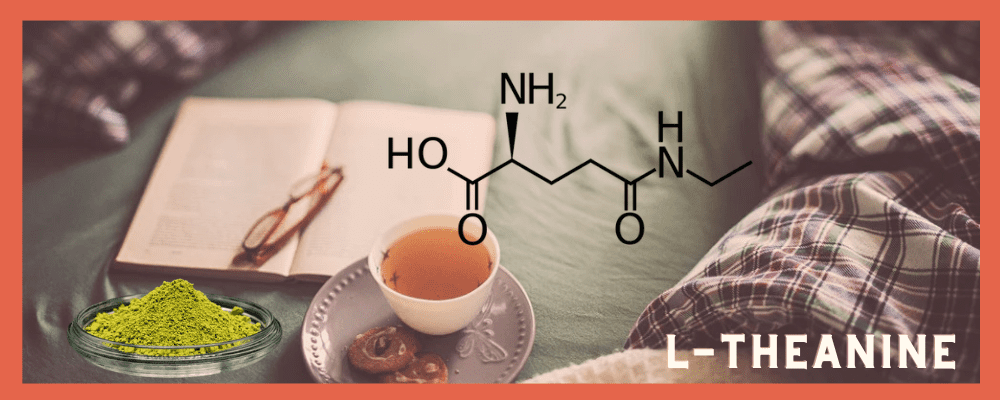
You can take L-Theanine multiple times daily, including in the morning before work and at night before bed.
If you’re looking to keep your mind sharp and stay on top of all the tasks throughout your day, consider taking a daily dose of L-Theanine. Not only will it help improve focus, but also provide clarity for an overall productivity boost!
When to Take L-theanine Morning or Night?
Are you wondering if L-theanine should be taken in the morning or at night? To maximize your sleep routine, take it before bed. If falling asleep is a challenge for you, avoid drinking caffeinated tea near bedtime and instead opt for decaffeinated teas or herbal options.
How Much L’theanine for Sleep?
Before beginning any supplement routine, it’s important to confer with a medical professional about the best dosage.
For L-Theanine and sleep, conventional wisdom suggests about 100-200 mg prior to bedtime; however, this could differ given specific factors like your age, weight or health condition. It is also essential that you choose reliable brands which have undergone testing for potency and purity standards.
What Сan You Not Mix With L-theanine?
L-theanine is an amino acid found primarily in tea leaves, especially in green tea, and is known for its potential calming and relaxation-inducing effects. While L-theanine is generally considered safe, there are certain substances and factors that should be taken into consideration when using it to ensure optimal results and avoid any potential interactions or unwanted side effects.
Caffeine: L-theanine is often paired with caffeine due to their natural co-occurrence in tea leaves. The combination of L-theanine and caffeine is believed to provide a unique synergy, promoting alertness without the jitteriness often associated with caffeine alone. However, excessive caffeine intake while taking L-theanine might diminish its calming effects. Finding the right balance between the two is important, and individual tolerance levels may vary.
Blood Pressure Medications: L-theanine has been suggested to have a mild hypotensive (blood pressure-lowering) effect. If you’re taking medications that already lower blood pressure, combining them with L-theanine might lead to an excessive drop in blood pressure. Consult your healthcare provider before using L-theanine if you’re on blood pressure medications.
Anti-Anxiety Medications: L-theanine’s potential calming effects might interact with medications prescribed for anxiety or sedation. Combining L-theanine with these medications could amplify their effects, leading to excessive relaxation or drowsiness. It’s crucial to consult your healthcare provider before using L-theanine alongside anti-anxiety medications.
Blood-Thinning Medications: Some evidence suggests that L-theanine might have a slight antiplatelet effect, which could impact blood clotting. If you’re taking blood-thinning medications or have a bleeding disorder, it’s advisable to discuss L-theanine supplementation with your healthcare provider to avoid any potential complications.
Sedatives and Sleep Aids: L-theanine’s relaxation-promoting effects might interact with sedatives and sleep aids, potentially intensifying their sedative properties. Combining L-theanine with these substances could lead to excessive drowsiness or grogginess. Consulting a healthcare professional before using L-theanine alongside sedatives is recommended.
Other Supplements or Medications: Always be cautious when combining L-theanine with other supplements or medications. While L-theanine is generally well-tolerated, it’s wise to consult a healthcare provider if you’re unsure about potential interactions, especially if you have underlying medical conditions or are taking multiple medications.
Pregnancy and Breastfeeding: Limited research is available on the safety of L-theanine during pregnancy and breastfeeding. As a precaution, pregnant and breastfeeding individuals should consult their healthcare provider before using L-theanine supplements.
In summary, while L-theanine is generally considered safe and well-tolerated, it’s important to exercise caution when combining it with certain substances or medications. To ensure your safety and achieve the desired effects, consult with a healthcare provider before introducing L-theanine into your regimen, especially if you have pre-existing medical conditions or are taking other medications. This will help you make informed decisions and maximize the benefits of L-theanine while minimizing potential risks.
Conclusion
If you’re having difficulty falling asleep, it can be hard to discover the underlying cause. To get some relief fast, consider using sleep supplements as a temporary measure while you research your situation further. With their help, you’ll be able to drift off and wake up feeling refreshed in no time!
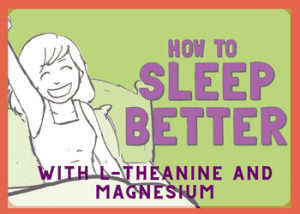 If you’re looking for a good night’s sleep, why not try L-theanine and magnesium supplements to experience their importance? These two natural supplements are proven to help reduce stress levels and relax both your mind and body.
If you’re looking for a good night’s sleep, why not try L-theanine and magnesium supplements to experience their importance? These two natural supplements are proven to help reduce stress levels and relax both your mind and body.
Enjoy an undisturbed sleep with these fantastic products that can be taken easily in the form of pills or powder!
Prioritizing your health and sleep is the surest way to improve your sleeping habits. But if you’re having trouble, taking natural supplements may be beneficial in aiding slumber.
Many people have difficulty falling asleep because their circadian rhythm has been disrupted. To reap maximum benefit, it’s imperative that we restore our body clocks back into proper alignment.
Let’s face it, a restful night of sleep is paramount to feeling your best and functioning optimally during the day. So if you’re still being kept up at night due to snoring, don’t worry – there are ways to stop this nuisance without medication or surgery. You can easily learn how to put an end to that loud ruckus with natural methods!
